When,While,As引导时间状语从句的区别
as when while引导时间状语从句的区别
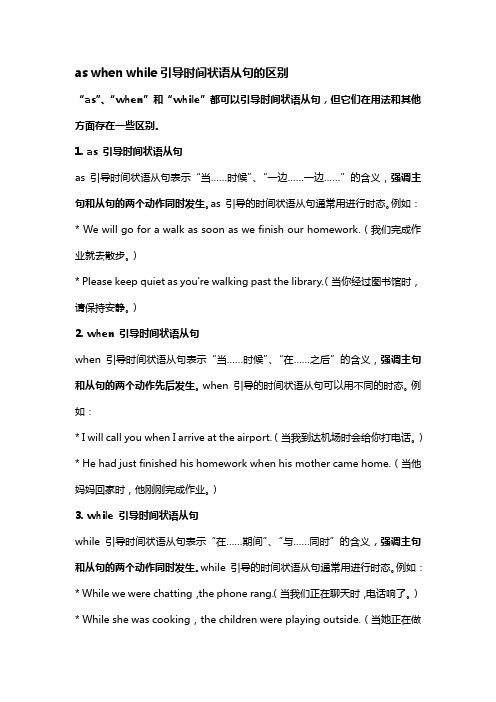
as when while引导时间状语从句的区别“as”、“when”和“while”都可以引导时间状语从句,但它们在用法和其他方面存在一些区别。
1. as 引导时间状语从句as 引导时间状语从句表示“当……时候”、“一边……一边……”的含义,强调主句和从句的两个动作同时发生。
as 引导的时间状语从句通常用进行时态。
例如:* We will go for a walk as soon as we finish our homework.(我们完成作业就去散步。
)* Please keep quiet as you're walking past the library.(当你经过图书馆时,请保持安静。
)2. when 引导时间状语从句when 引导时间状语从句表示“当……时候”、“在……之后”的含义,强调主句和从句的两个动作先后发生。
when 引导的时间状语从句可以用不同的时态。
例如:* I will call you when I arrive at the airport.(当我到达机场时会给你打电话。
)* He had just finished his homework when his mother came home.(当他妈妈回家时,他刚刚完成作业。
)3. while 引导时间状语从句while 引导时间状语从句表示“在……期间”、“与……同时”的含义,强调主句和从句的两个动作同时发生。
while 引导的时间状语从句通常用进行时态。
例如:* While we were chatting,the phone rang.(当我们正在聊天时,电话响了。
)* While she was cooking,the children were playing outside.(当她正在做饭时,孩子们在外面玩耍。
)总之,as、when和while都可以引导时间状语从句,但它们在用法和其他方面存在区别。
when、 as、 while引导的时间状语从句
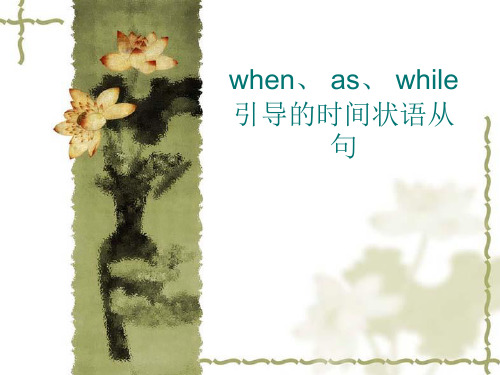
二.选择最佳答案: 1.She thought I was praising her child, _____,in fact,I was scolding him for his bad behaviors at school. A.what B.while C.so that D.therefore 2.I do every single bit of housework ____ my husband Bob just does the dishes now and then.(2004全国卷II35) A.while B.since C.when D.as 3.______ it is expected that students come university with the ability to take a good set of notes,this is not always the case. A.When B.As C.For D.While
when、 as、 while 引导的时间状语从 句
1. when、 as、 while引导的时间状语从句分析: (1) when引导时间状语从句时表示“当……的 时候”, when既可以指时间段也可指时间点, 从句中既可用延续性动词又可用非延续性动词, 且动作既可和主句的动作同时发生又可在主句的 动作之前或之后发生, 注意体会如下例句: I’ll call you when I get there. 我一到那里 就给你打电话。
三、While作并列连词用,意思为“而,然而”, 表对比。而but表转折。注意用心比较体会while 与but的句中用意 1.Some people waste food while others haven't enough. 有些人很费粮食,然而有些人却吃不饱。 2.The son was having a good meal at home,while the parents were working in the fields. 儿子在家吃好饭而父母却在田里辛勤劳作。 3.I ought to have helped her,but I never could. 我本该帮她但没能。
when和while和as的区别口诀
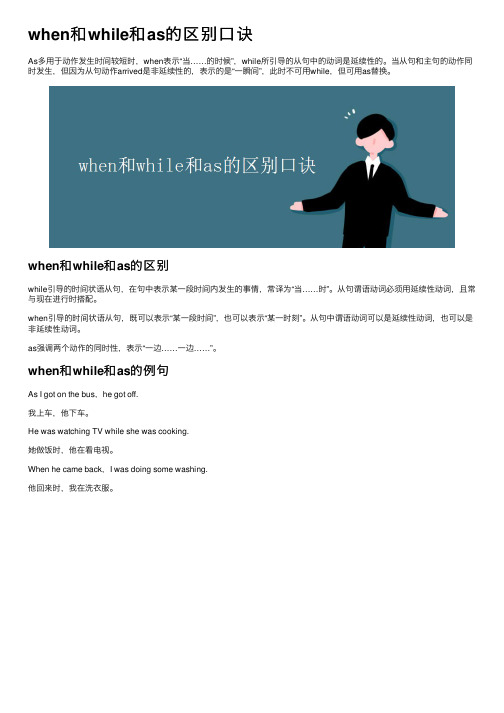
when和while和as的区别⼝诀
As多⽤于动作发⽣时间较短时,when表⽰“当……的时候”,while所引导的从句中的动词是延续性的。
当从句和主句的动作同时发⽣,但因为从句动作arrived是⾮延续性的,表⽰的是“⼀瞬间”,此时不可⽤while,但可⽤as替换。
when和while和as的区别
while引导的时间状语从句,在句中表⽰某⼀段时间内发⽣的事情,常译为“当……时”。
从句谓语动词必须⽤延续性动词,且常与现在进⾏时搭配。
when引导的时间状语从句,既可以表⽰“某⼀段时间”,也可以表⽰“某⼀时刻”。
从句中谓语动词可以是延续性动词,也可以是⾮延续性动词。
as强调两个动作的同时性,表⽰“⼀边……⼀边……”。
when和while和as的例句
As I got on the bus,he got off.
我上车,他下车。
He was watching TV while she was cooking.
她做饭时,他在看电视。
When he came back,I was doing some washing.
他回来时,我在洗⾐服。
when while as引导时间状语从句的区别

when,while,as引导时间状语从句的区别when,while,as显然都可以引导时间状语从句,但用法区别非常大。
一、when可以和延续性动词连用,也可以和短暂性动词连用;而while 和as只能和延续性动词连用。
①Why do you want a new job when youve got such a good one already?(get为短暂性动词)你已经找到如此好的工作,为何还想再找新的?②Sorry,I was out when you called me.(call为短暂性动词)对不起,你打电话时我刚好外出了。
③Strike while the iron is hot.(is为延续性动词,表示一种持续的状态)趁热打铁。
④The students took notes as they listened.(listen为延续性动词)学生们边听课边做笔记。
二、when从句的谓语动词可以在主句谓语动作之前、之后或同时发生;while和as从句的谓语动作必须是和主句谓语动作同时发生。
1.从句动作在主句动作前发生,只用when。
①When he had finished his homework,he took a short rest.(finished先发生)当他完成作业后,他休息了一会儿。
②When I got to the airport,the guests had left.(got to后发生)当我赶到飞机场时,客人们已经离开了。
2.从句动作和主句动作同时发生,且从句动作为延续性动词时,when,while,as都可使用。
①When /While /As we were dancing,a stranger came in.(dance为延续性动词)当我们跳舞时,一位陌生人走了进来。
②When /While /As she was making a phonecall,I was writing a letter.(make为延续性动词)当她在打电话时,我正在写信。
英语中when、while、as引导时间状语从句的区别
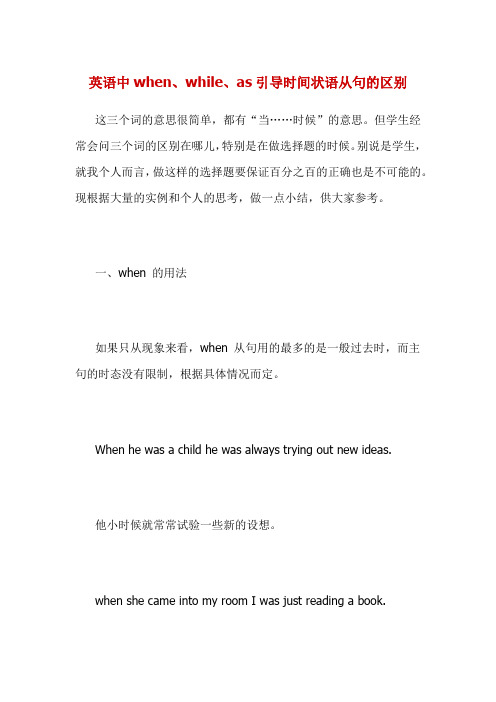
英语中when、while、as引导时间状语从句的区别这三个词的意思很简单,都有“当……时候”的意思。
但学生经常会问三个词的区别在哪儿,特别是在做选择题的时候。
别说是学生,就我个人而言,做这样的选择题要保证百分之百的正确也是不可能的。
现根据大量的实例和个人的思考,做一点小结,供大家参考。
一、when 的用法如果只从现象来看,when 从句用的最多的是一般过去时,而主句的时态没有限制,根据具体情况而定。
When he was a child he was always trying out new ideas.他小时候就常常试验一些新的设想。
when she came into my room I was just reading a book.她走进我房间时,我正在看书。
Were you writing when the teacher came in?老师进来的时候,你在写信吗?Sorry,I was out when you called me.对不起,你打电话来的时候我出去了。
He was on the point of leaving when someone knocked at the door.他正要走,这时有人敲门。
I thought of it just when you opened your mouth.就在你要说话的时候,我也想到了。
I had hardly[scarcely] closed my eyes when someone knocked at the door.我刚一闭上眼,就有人在敲门了。
根据以上的例句,我们可以总结出一点:when 从句的A事件,相当于另一个事件B发生的时间点。
也就是说,when 从句的重点不在动作本身发生的状态,而只是把它作为一个时间点,所以when 多数情况下用的是一般过去时,则不用正在进行时。
因为如果用正在进行时,它表示的就是一段时间而不是一个时间点了。
when、as、while引导的时间状语从句用法区别

(1) when引导时间状语从句,表示“当……的时候”,when既可以指时间段,也可指时间点,从句中既可用延续性动词,也可用非延续性动词,且动作既可和主句的动作同时发生,又可在主句的动作之前或之后发生。
例如:When the decision was read out Mrs Gardner thanked the judges. 判决书宣读完,加德纳夫人向法官们表示感谢。
When the wind blows, all the doors rattle. 只要风一吹,这门就吱嘎作响。
He stopped trying, when he might have succeeded next time. 他不再试了,其实他可能下一次就成功。
When you are sitting, keep your elbow on the arm rest. 坐立时,把胳膊肘靠在扶手上。
如果when引导的时间状语从句的主语与主句主语相同,而从句的谓语又是be动词时,那么从句中的主语和be可以省略; 当when引导的时间状语从句的主语与主句主语相同时,往往还可以用“when+分词”的形式替代该状语从句。
例如:When (you are) in trouble, ask her for help. 当你遭遇麻烦的时候去向她求助。
When I came into the room (=When coming into the room), I found him lying there dead. 当我进入房间的时候,我发现他躺在那儿死了。
(2) while引导时间状语从句时表示“当……的时候”,它强调主句的动作与从句的动作同时持续地进行,用于这一用法时while引导的时间状语从句和主句中的谓语动词必须是延续性动词,或者主句的动作发生在从句动作的进行过程中,主句中的谓语动词通常是非延续性动词例如:Study while you study; play while you play. 该学习的时候就学习,该玩的时候就玩。
when,while,as引导时间状语从句的区别是什么?

when,while,as引导时间状语从句的区别是什么?when和while的区别1.when是at or during the time that, 既指时间点,也可指一段时间while是during the time that,只指一段时间因此when引导的时间状语从句中的动词可以是终止性动词,也可以是延续性动词而while从句中的动词必须是延续性动词。
I was just reading a book when she came into my room.她走进我房间时,我正在看书。
You can’t do your homework while you’re watching TV.你不能一边看电视一边做家庭作业。
2.when 说明从句的动作和主句的动作可以是同时,也可以是先后发生;while 则强调主句的动作在从句动作的发生的过程中或主从句两个动作同时发生。
Were you writing when the teacher came in?老师进来的时候,你在写信吗?While Jim was mending his bike, Lin Tao came to see him.正当吉姆修自行车时,林涛来看他。
3.另外,when和while的区别还在于:while引导的时间状语从句多用进行时态,而when引导的时间状语从句多用一般时态。
While they were talking , the bell rang. 正在他们谈话的时候,上课铃响了。
I was doing my homework when my mother came back home yesterday evening.昨天晚上妈妈回家的时候,我正在做家庭作业4.when和while 还可作并列连词。
when表示“在那时”;while 表示“而,却”,表对照关系。
如:The children were running to move the bag of rice when they heard the sound of a motor bike.孩子们正要跑过去搬开那袋米,这时他们听到了摩托车的声音。
英语学习:while,when,as三者引导的时间状语从句

【导语】时间状语从句算是状语从句中最简单的⼀类,也是我们⽇常⽣活交流中最常⽤的⼀类,虽然难度不⼤,但引导词也不少,仍然有不少同学会弄混那⼏个常见引导词的⽤法,为⼤家带来as,when,while这⼏个词的辨析⽅法,⼀起看看吧。
三者可表⽰“当……时候”,区别如下:(1) 若主句表⽰的是⼀个短暂性动作,从句表⽰的是⼀个持续性动作,三者都可⽤:He fell asleep when [while, as] he was reading. 他看书时睡着了。
【注】as ⽤于引出⼀个持续性动词表⽰“在……期间”时,其谓语通常只能是那些含有动作(action)和发展(development) 意味的动词,⼀般不能是那些不⽤于进⾏时态的动词(如 be, seem, love, want, agree, see, know, have 等),所以下⾯⼀句中的 while 不能换为 as:A:I’m going to the post office. 我要去邮局。
B:While you’re there, can you get me some stamps? 当你在邮局时,能帮我买⼏张邮票吗?(2) 若主、从句表⽰两个同时进⾏的持续性动作,且强调主句表⽰的动作延续到从句所指的整个时间,通常要⽤ while:Don’t talk while you’re eating. 吃饭时不要说话。
I kept silent while he was writing. 在他写的时候,我默不作声。
但是,若主从句表⽰的两个同时进⾏的动作含有“⼀边…⼀边”之意思,通常⽤ as:She sang as she went along. 她边⾛边唱。
(3) 若从句是⼀个短暂性动作,主句是⼀个持续性动作,可⽤ as / when 但不⽤ while:It was raining hard when [as] we arrived. 我们到达时正下着⼤⾬。
while,when,as用法

2. 引导原因状语从句:because; since 由于;因为
I must stop now as I have to go out. 我得就此打住了,因为我得出去。 3. 引导让步状语从句:although 尽管,虽然 Sweet as he is, he doesn't pay his bills. 他虽然和蔼可亲,却不买账。
He likes listening to music, while I enjoy watching TV.
While 的其他词性
• n.一会儿时间 • stay for a while. 停留一会儿。 • Wait a while. 等一会儿。 • The project wasn't worth my while. • 这项方案不值得我花工夫。 • v.消磨:闲散或轻松地消磨时间
2. 引导让步状语从句:although 虽然,然而,可是 I'm saying it now when I should have told you long ago. 我早就应该告诉你了,可是我现在才说。
3. 引导原因状语从句:considering that考虑到,既然
How can they expect to learn anything when they never listen. 既然他们从不听讲,他们怎么能指望学到东西呢? 4. 引导条件状语从句:if 如果
When the weather is good, I usually go to the country. 若是天气好的话, 我总是到乡下去。
5. 连接并列句:after which; and just then 一……就……,正在这时
He had just drifted off to sleep when the phone rang.
as while when引导时间状语从句的区别

AS,WHILE,WHEN引导时间状语从句的区别噫,说起AS、WHILE、WHEN这三个词儿,它们在句子里头引导时间状语从句的时候,差别还是挺大的哟。
AS嘛,就好比说“跟到……一样”,它强调的是两个动作或者事情同时发生,不分先后,就像你吃饭跟到看电视一样,同时进行。
比如说,“As I was walking down the street,I saw a cat.”就是说“我走在街上的时候,看到了一只猫。
”,这里走路跟到看到猫是同时发生的。
WHILE呢,它有点“在……期间”的意思,也是说两个动作同时进行,但是它更侧重于强调一个动作在另一个动作持续进行的期间内发生。
比如说,“While I was studying,my roommate was sleeping.”就是说“我在学习的时候,我室友在睡觉。
”,这里强调的是学习这个动作的持续期间内,室友在睡觉。
WHEN呢,它就比较灵活了,可以表示“当……的时候”,既可以指两个动作同时发生,也可以指一个动作在另一个动作之前或者之后发生。
比如说,“When I got home,I found my keys were missing.”就是说“我回到家的时候,发现我的钥匙不见了。
”,这里回家跟到发现钥匙不见了,就有先后顺序了。
所以说,AS、WHILE、WHEN虽然都是引导时间状语从句的词儿,但是它们的意思和用法还是有区别的,咱们得根据句子的意思来选择合适的词儿哈。
英语演讲稿中When,While,As的区别使用

英语演讲稿中When,While,As的区别使用虽然when,while,as都可以引导时间状语从句,但是他们的用法区别还是很大的,下面是关于When,While,As引导时间状语从句的区别,供学生参考!一、when可以和延续性动词连用,也可以和短暂性动词连用;而while和as只能和延续性动词连用。
①Whydoyouwantanewjobwhenyou’vegotsuchagoodonealre ady?(get为短暂性动词)你已经找到如此好的工作,为何还想再找新的?②Sor ry,Iwasoutwhenyoucalledme.(call为短暂性动词)对不起,你打电话时我刚好外出了。
③Strike whiletheironishot.(is为延续性动词,表示一种持续的状态)趁热打铁。
④Thestudentstooknotesastheylistened.(listen为延续性动词)学生们边听课边做笔记。
二、when从句的谓语动词可以在主句谓语动作之前、之后或同时发生;while和as从句的谓语动作必须是和主句谓语动作同时发生。
1.从句动作在主句动作前发生,只用when。
①When hehadfinishedhishomework,hetookashortrest.(finished先发生)当他完成作业后,他休息了一会儿。
②When Igottotheairport,theguestshadleft.(gotto后发生)当我赶到飞机场时,客人们已经离开了。
2.从句动作和主句动作同时发生,且从句动作为延续性动词时,when,while,as都可使用。
①When/While/Asweweredancing,astrangercamein.(dance为延续性动词)当我们跳舞时,一位陌生人走了进来。
②When/While/Asshewasmakingaphonecall,Iwaswritingaletter.(make为延续性动词)当她在打电话时,我正在写信。
When,While,As引导时间状语从句的区别
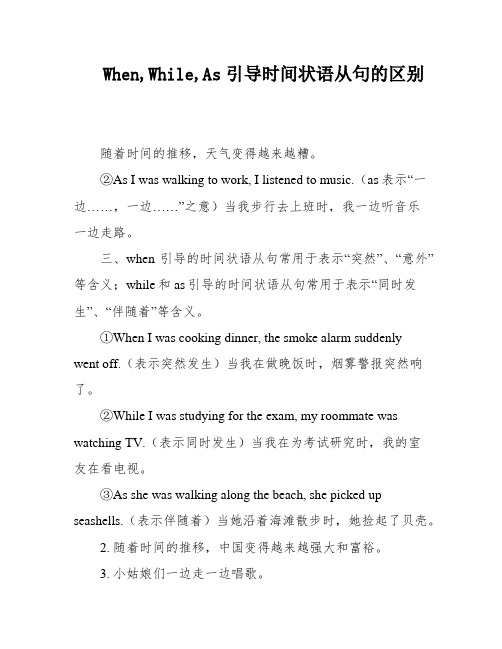
When,While,As引导时间状语从句的区别
随着时间的推移,天气变得越来越糟。
②As I was walking to work, I listened to music.(as表示“一边……,一边……”之意)当我步行去上班时,我一边听音乐
一边走路。
三、when引导的时间状语从句常用于表示“突然”、“意外”等含义;while和as引导的时间状语从句常用于表示“同时发生”、“伴随着”等含义。
①When I was cooking dinner, the smoke alarm suddenly
went off.(表示突然发生)当我在做晚饭时,烟雾警报突然响了。
②While I was studying for the exam, my roommate was watching TV.(表示同时发生)当我在为考试研究时,我的室
友在看电视。
③As she was walking along the beach, she picked up seashells.(表示伴随着)当她沿着海滩散步时,她捡起了贝壳。
2. 随着时间的推移,中国变得越来越强大和富裕。
3. 小姑娘们一边走一边唱歌。
5. 伤心的母亲坐在路边,一边哭一边喊叫。
1. 当我读完这本书后,你可以借阅。
2. 下周经理来参观时,我会和他谈论这个问题。
译林版英语九年级上册_名师指导:when,while,as引导时间状语从句的区别
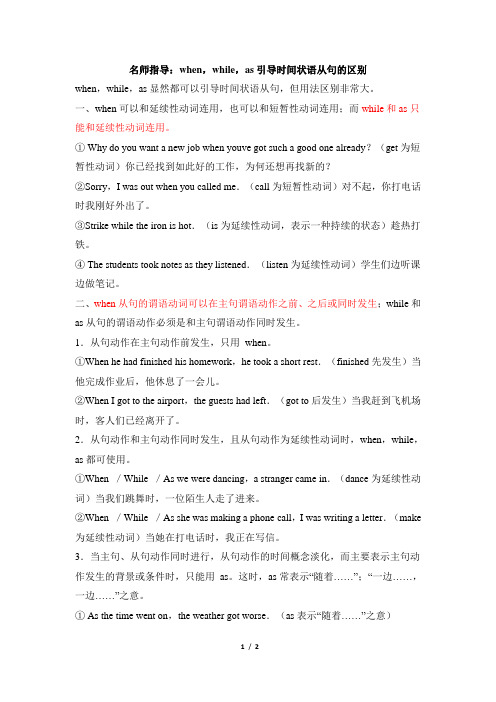
名师指导:when,while,as引导时间状语从句的区别when,while,as显然都可以引导时间状语从句,但用法区别非常大。
一、when可以和延续性动词连用,也可以和短暂性动词连用;而while和as只能和延续性动词连用。
① Why do you want a new job when youve got such a good one already?(get为短暂性动词)你已经找到如此好的工作,为何还想再找新的?②Sorry,I was out when you called me.(call为短暂性动词)对不起,你打电话时我刚好外出了。
③Strike while the iron is hot.(is为延续性动词,表示一种持续的状态)趁热打铁。
④ The students took notes as they listened.(listen为延续性动词)学生们边听课边做笔记。
二、when从句的谓语动词可以在主句谓语动作之前、之后或同时发生;while和as从句的谓语动作必须是和主句谓语动作同时发生。
1.从句动作在主句动作前发生,只用when。
①When he had finished his homework,he took a short rest.(finished先发生)当他完成作业后,他休息了一会儿。
②When I got to the airport,the guests had left.(got to后发生)当我赶到飞机场时,客人们已经离开了。
2.从句动作和主句动作同时发生,且从句动作为延续性动词时,when,while,as都可使用。
①When /While /As we were dancing,a stranger came in.(dance为延续性动词)当我们跳舞时,一位陌生人走了进来。
②When /While /As she was making a phone call,I was writing a letter.(make 为延续性动词)当她在打电话时,我正在写信。
when--while--as-的区别
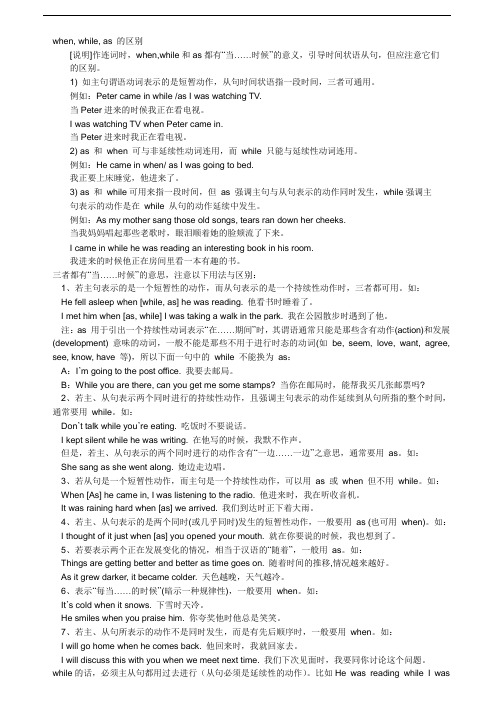
when, while, as 的区别[说明]作连词时,when,while和as都有“当……时候”的意义,引导时间状语从句,但应注意它们的区别。
1) 如主句谓语动词表示的是短暂动作,从句时间状语指一段时间,三者可通用。
例如:Peter came in while /as I was watching TV.当Peter进来的时候我正在看电视。
I was watching TV when Peter came in.当Peter进来时我正在看电视。
2) as 和when 可与非延续性动词连用,而while 只能与延续性动词连用。
例如:He came in when/ as I was going to bed.我正要上床睡觉,他进来了。
3) as 和while可用来指一段时间,但as 强调主句与从句表示的动作同时发生,while强调主句表示的动作是在while 从句的动作延续中发生。
例如:As my mother sang those old songs, tears ran down her cheeks.当我妈妈唱起那些老歌时,眼泪顺着她的脸颊流了下来。
I came in while he was reading an interesting book in his room.我进来的时候他正在房间里看一本有趣的书。
三者都有“当……时候”的意思,注意以下用法与区别:1、若主句表示的是一个短暂性的动作,而从句表示的是一个持续性动作时,三者都可用。
如:He fell asleep when [while, as] he was reading. 他看书时睡着了。
I met him when [as, while] I was taking a walk in the park. 我在公园散步时遇到了他。
注:as 用于引出一个持续性动词表示“在……期间”时,其谓语通常只能是那些含有动作(action)和发展(development) 意味的动词,一般不能是那些不用于进行时态的动词(如be, seem, love, want, agree, see, know, have 等),所以下面一句中的while 不能换为as:A:I’m going to the post office. 我要去邮局。
when.while as 的区别用法
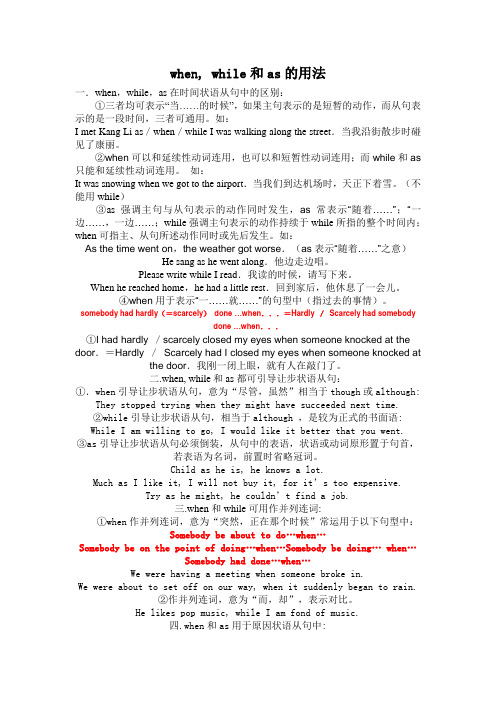
when, while和as的用法一.when,while,as在时间状语从句中的区别:①三者均可表示“当……的时候”,如果主句表示的是短暂的动作,而从句表示的是一段时间,三者可通用。
如:I met Kang Li as/when/while I was walking along the street.当我沿街散步时碰见了康丽。
②when可以和延续性动词连用,也可以和短暂性动词连用;而while和as只能和延续性动词连用。
如:It was snowing when we got to the airport.当我们到达机场时,天正下着雪。
(不能用while)③as强调主句与从句表示的动作同时发生,as常表示“随着……”;“一边……,一边……;while强调主句表示的动作持续于while所指的整个时间内;when可指主、从句所述动作同时或先后发生。
如:As the time went on,the weather got worse.(as表示“随着……”之意)He sang as he went along.他边走边唱。
Please write while I read.我读的时候,请写下来。
When he reached home,he had a little rest.回到家后,他休息了一会儿。
④when用于表示“一……就……”的句型中(指过去的事情)。
somebody had hardly(=scarcely)done …when...=Hardly /Scarcely had somebodydone …when...①I had hardly /scarcely closed my eyes when someone knocked at the door.=Hardly /Scarcely had I closed my eyes when someone knocked at the door.我刚一闭上眼,就有人在敲门了。
while,when,as用法

他刚迷迷糊糊地睡下,这时电话铃就响了。
三、as的用法 1. 引导时间状语从句: during the time when; while 在……期间;当……时候
As she grew older, she kept more to herself. 随着年龄的增长,她变得更沉默了。
She kissed him goodbye, as usual. 她同平常一样和他吻别。 5. [用于在陈述中增加或插入评论] 正如… As you can see, I didn't go after all. 你看,我毕竟没有去。
while, when与as用法辨析:
(1) while引导时间状语从句作“当……时 候”讲时,只能与延续性动词连用。
既然他们从不听讲,他们怎么能指望学到 东西呢?
4. 引导条件状语从句:if 如果
When the weather is good, I usually go to the country. 若是天气好的话, 我总是 到乡下去。
5. 连接并列句:after which; and just then 一……就……,正在这时
二、when的用法 1. 引导让步状语从句:although 虽然, 然而,可是
I'm saying it now when I should have told you long ago. 我早就应该告诉你了,可是我现在才说。
2. 引导时间状语从句:at / during / after the time that 在/当……时;在……之后
while, when, as用法:
- 1、下载文档前请自行甄别文档内容的完整性,平台不提供额外的编辑、内容补充、找答案等附加服务。
- 2、"仅部分预览"的文档,不可在线预览部分如存在完整性等问题,可反馈申请退款(可完整预览的文档不适用该条件!)。
- 3、如文档侵犯您的权益,请联系客服反馈,我们会尽快为您处理(人工客服工作时间:9:00-18:30)。
When,While,As引导时间状语从句的区别
when,while,as显然都可以引导时间状语从句,但用法区别非常大。
一、when可以和延续性动词连用,也可以和短暂性动词连用;而while和as 只能和延续性动词连用。
① Why do you want a new job when you’ve got such a good one already?(get为短暂性动词)你已经找到如此好的工作,为何还想再找新的?
②Sorry,I was out when you called me.(call为短暂性动词)对不起,你打电话时我刚好外出了。
③Strike while the iron is hot.(is为延续性动词,表示一种持续的状态)趁热打铁。
④ The students took notes as they listened.(listen为延续性动词)学生们边听课边做笔记。
二、when从句的谓语动词可以在主句谓语动作之前、之后或同时发生;while 和as从句的谓语动作必须是和主句谓语动作同时发生。
1.从句动作在主句动作前发生,只用 when。
①When he had finished his homework,he took a short rest.(finished 先发生)当他完成作业后,他休息了一会儿。
②When I got to the airport,the guests had left.(got to后发生)当我赶到飞机场时,客人们已经离开了。
2.从句动作和主句动作同时发生,且从句动作为延续性动词时,when,while,as都可使用。
①When /While /As we were dancing,a stranger came in.(dance为延续性动词)当我们跳舞时,一位陌生人走了进来。
②When /While /As she was making a phone call,I was writing a letter.(make为延续性动词)当她在打电话时,我正在写信。
3.当主句、从句动作同时进行,从句动作的时间概念淡化,而主要表示主句动作发生的背景或条件时,只能用 as。
这时,as常表示“随着……”;“一边……,一边……”之意。
① As the time went on,the weather got worse.(as表示“随着……”之意)
② The atmosphere gets thinner and thinner as the height increases.随着高度的增加,大气越来越稀薄。
③As years go by,China is getting stronger and richer.随着时间一年一年过去,中国变得越来越富强了。
④The little girls sang as they went.小姑娘们一边走,一边唱。
⑤The sad mother sat on the roadside,shouting as she was crying.伤心的妈妈坐在路边,边哭边叫。
4.在将来时从句中,常用when,且从句须用一般时代替将来时。
①You shall borrow the book when I have finished reading it.在我读完这本书后,你可以借阅。
②When the manager comes here for a visit next week,Ill talk with him about this.下周,经理来这参观时,我会和他谈谈此事。
三、when用于表示“一……就……”的句型中(指过去的事情)。
sb.had hardly(=scarcely) done sth.when...=Hardly / Scarcely had sb.done sth.when...
①I had hardly /scarcely closed my eyes when someone knocked at the door.=Hardly / Scarcely had I closed my eyes when someone knocked at the door.我刚一闭上眼,就有人在敲门了。
②I had hardly /scarcely entered my room when the telephone rang.=Hardly /Scarcely had I entered my room when the telephone rang.我刚一走进房门,电话就响了。
When\while\as的区别
①when是at or during the time that, 既指时间点,也可指一段时间;
while是during the time that,只指一段时间,因此when引导的时间状语从句中的动词可以是终止性动词,也可以是延续性动词,而while从句中的动词必须是延续性动词。
②when说明从句的动作和主句的动作可以是同时,也可以是先后发生;while 则强调主句的动作在从句动作的发生的过程中或主从句两个动作同时发生。
③由when引导的时间状语从句,主句用过去进行时,从句应用一般过去时;如果从句和主句的动作同时发生,两句都用过去进行时的时候,多用while引导,如:
a. When the teacher came in, we were talking.
当此句改变主从句的位置时,则为:
While we were talking, the teacher came in.
b. They were singing while we were dancing.
④when和while 还可作并列连词。
when表示“在那时”;while表示“而,却”,表对照关系。
如:
a. The children were running to move the bag of rice when they heard the sound of a motor bike.
孩子们正要跑过去搬开那袋米,这时他们听到了摩托车的声音。
b. He is strong while his brother is weak.
他长得很结实,而他弟弟却很瘦弱。
具体你可以参考这一段。
